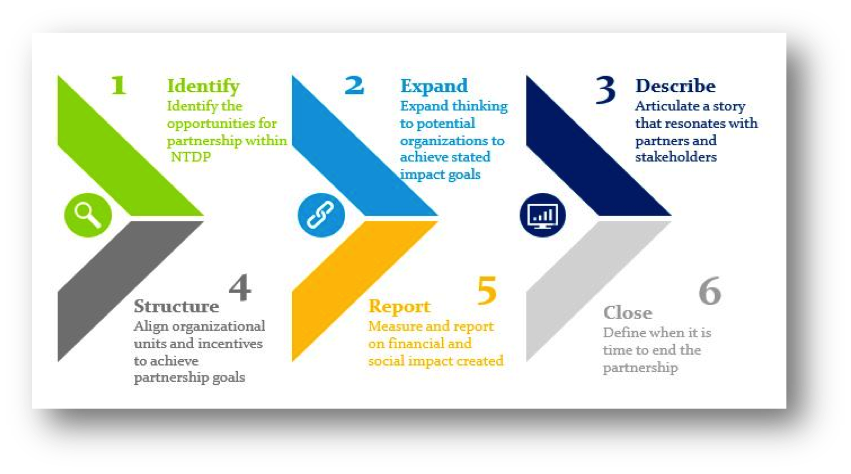Strategic Social Partnerships Take Hold at the Ghana Health Service and NTD Program
November 30th, 2015
Partnerships are hardly unusual in the public health arena. More often than not they spring up organically, are limited in scope, and focus on achieving a specific, predefined goal. Once the initial goal has been achieved, these partnerships tend to simply disintegrate.
Yet what if the organizations involved, rather than relying on happenstance, took the time to carefully and strategically plan for new partnerships in the same way that they do when launching other new organizational initiatives? Would this affect their choice of partners and improve the longevity, scope and value of the partnership?
The Neglected Tropical Diseases Program (NTDP) and other officials at the Ghana Health Service (GHS) decided to find out. In 2015, twenty-three senior GHS and NTDP officials participated in an END in Africa event with staff from Deloitte Consulting LLP to discuss partnership planning within the context of their finance strategy and sustainability planning. Looking for ways to engage a broader community of actors in supporting Neglected Tropical Disease (NTD) control and elimination efforts in Ghana, they worked with the staff at Deloitte to outline the steps they’d need to take to bring new partners to the table and create Strategic Social Partnerships that could help GHS meet its goals while strengthening the NTDP’s sustainability and impact.

SSP Framework: The SSP methodology helps identify potential partners and define common values to form the basis of successful partnerships. Source: Deloitte Consulting LLP
Social Partnerships (SSPs)
SSPs are partnerships between organizations. Structured so as to provide value across multiple layers of each partner organization, SSPs create shared value across functions as well as aligned value across organizations.
Through SSPs, organizations are able to draw upon specialized capabilities or assets of each partner and access new skills and resources that were previously unavailable when working alone. For example, a chocolate manufacturer may partner with a farmers’ collective to purchase high-quality cocoa. This partnership creates multiple value streams by solidifying the cocoa supply chain, creating a steady revenue source for small farmers, and institutionalizing quality standards in the participating farms.
While SSPs may involve financial exchanges among the partners, they are not limited to revenue creation or fundraising. They also include elements of knowledge and function sharing as well as in-kind and implementation assistance.
SSPs for Ghana’s Neglected Tropical Disease Program
The SSP strategy session in Ghana attracted top GHS officials, namely the Deputy Director General, Director of Public Health, Director of Policy, Planning, Monitoring & Evaluation (PPME), Director of Finance, and several top NTDP officials.
During the session, participants discussed the role of SSPs in the context of NTDs and the framework for identifying and creating them. They also identified areas across the NTD value chain that would benefit from new partner support. This process leveraged TIPAC data as well as market analysis of potential players on the market. Finally, the team started to define the potential value that an NTD program could bring to its new partners – which is the cornerstone of a successful SSP. The session output was the start of an SSP action plan, which the NTDP is now starting to implement.
The participation of top GHS and NTDP officials was important for the SSP planning exercise, as the group dynamic solidified high-level GHS support for SSPs within the context of the NTD program and set in motion institutional changes across the GHS to attract, manage and maintain new partnerships. Following a decision to use the NTD initiative as a pilot to feed a broader SSP program across the organization, GHS leadership created a dedicated SSP team within the PPME Division, which will now directly support the Ghana NTD Program as it implements the SSP action plan.
More information is available about SSPs in John Mennel and Tina Mendelson’s Roadmap toward Effective Strategic Social Partnerships (Deloitte University Press, 2013).

